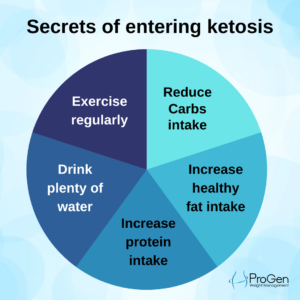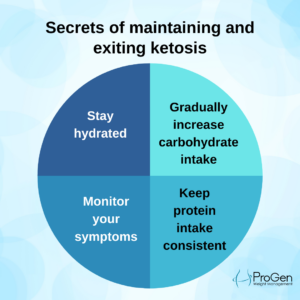Ketosis is a metabolic state in which the body uses ketones as its primary source of energy instead of glucose. Glucose is typically the body’s preferred source of energy, but when carbohydrate intake is restricted and the body runs low on glucose, it turns to fat stores for energy. The process of breaking down fatty acids for energy production results in the production of ketone bodies, which can be used by the body for energy in the absence of glucose.
Scientifically, ketosis is characterised by elevated levels of ketone bodies in the blood, typically greater than 0.5 millimoles per liter (mmol/L). The primary ketone body produced during ketosis is beta-hydroxybutyrate (BHB), which can be measured in the blood, urine, or breath.
In addition to being a metabolic state, ketosis has been studied for its potential health benefits, including weight loss, improved insulin sensitivity, and reduced symptoms in certain neurological disorders. However, it is important to note that not all people may experience these benefits and that some individuals may experience negative effects from ketosis, such as decreased athletic performance or increased risk of kidney stones. Therefore, it is important to consult with a healthcare professional before intentionally inducing ketosis.
Here are more details on the steps to transition into and out of ketosis:
Entering ketosis:
- Reduce carbohydrate intake: Reducing your carbohydrate intake is the key to entering ketosis. To do this, you’ll need to limit your daily carbohydrate intake to less than 50 grams per day. This will force your body to switch from using glucose as its primary source of energy to using ketones, which are produced from stored fat.
- Increase healthy fat intake: To make up for the reduction in carbohydrates, you’ll need to increase your healthy fat intake. Healthy fats include avocado, nuts, oils, and fatty fish. These foods will provide your body with the energy it needs to function and support ketosis.
- Increase protein intake: It’s also important to increase your protein intake when entering ketosis. This will help to prevent muscle loss, which can occur when your body is in a state of energy restriction. Aim for about 0.8 – 1.5 grams of protein per kilogram of body weight each day. Might vary depending on different body type.
- Drink plenty of water: Staying hydrated is essential for overall health and can also help support your body’s transition into ketosis. Aim to drink at least 8 glasses of water each day helps to avoid dehydration and constipation.
- Exercise regularly: Regular physical activity can help increase the rate at which your body enters ketosis. Aim for at least 30 minutes of moderate exercise each day, such as brisk walking, cycling, or swimming.
Maintaining or exiting ketosis:
- Gradually increase carbohydrate intake: To exit ketosis, you’ll need to gradually increase your carbohydrate intake over a period of a few days or weeks. This will allow your body to slowly adjust to the change and avoid any negative symptoms, such as headaches or fatigue.
- Keep protein intake consistent: It’s important to maintain a consistent protein intake to support muscle mass, even as you increase your carbohydrate intake.
- Monitor your symptoms: Pay attention to how your body feels as you transition out of ketosis. If you experience headaches, fatigue, or other symptoms, you may need to slow down the process or adjust your diet.
Regardless of your weight or activity level, staying hydrated is vital for better body function and is an important part of your lifestyle.
ProGen Weight Management works exactly focus on this method. We are specialised in giving you the best weight loss diet possible. Entering Ketosis and maintaining it is much easier and faster with the best diet clinic in Bangalore – ProGen Weight Management. To know more about our program or if you have any doubts/questions, kindly visit our website www.progenmethod.com or click to find our location
It’s important to remember that everyone’s body is different, and the rate at which you transition into and out of ketosis may vary. It may also take some time for your body to adjust to these changes, so be patient and listen to your body. If you have any concerns or questions, it’s always a good idea to consult with a healthcare professional.
Sources: https://core.ac.uk/download/pdf/82718965.pdf



